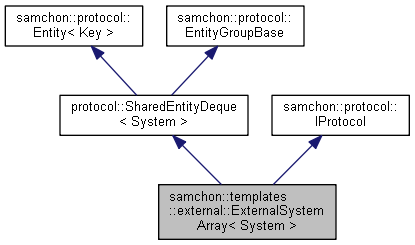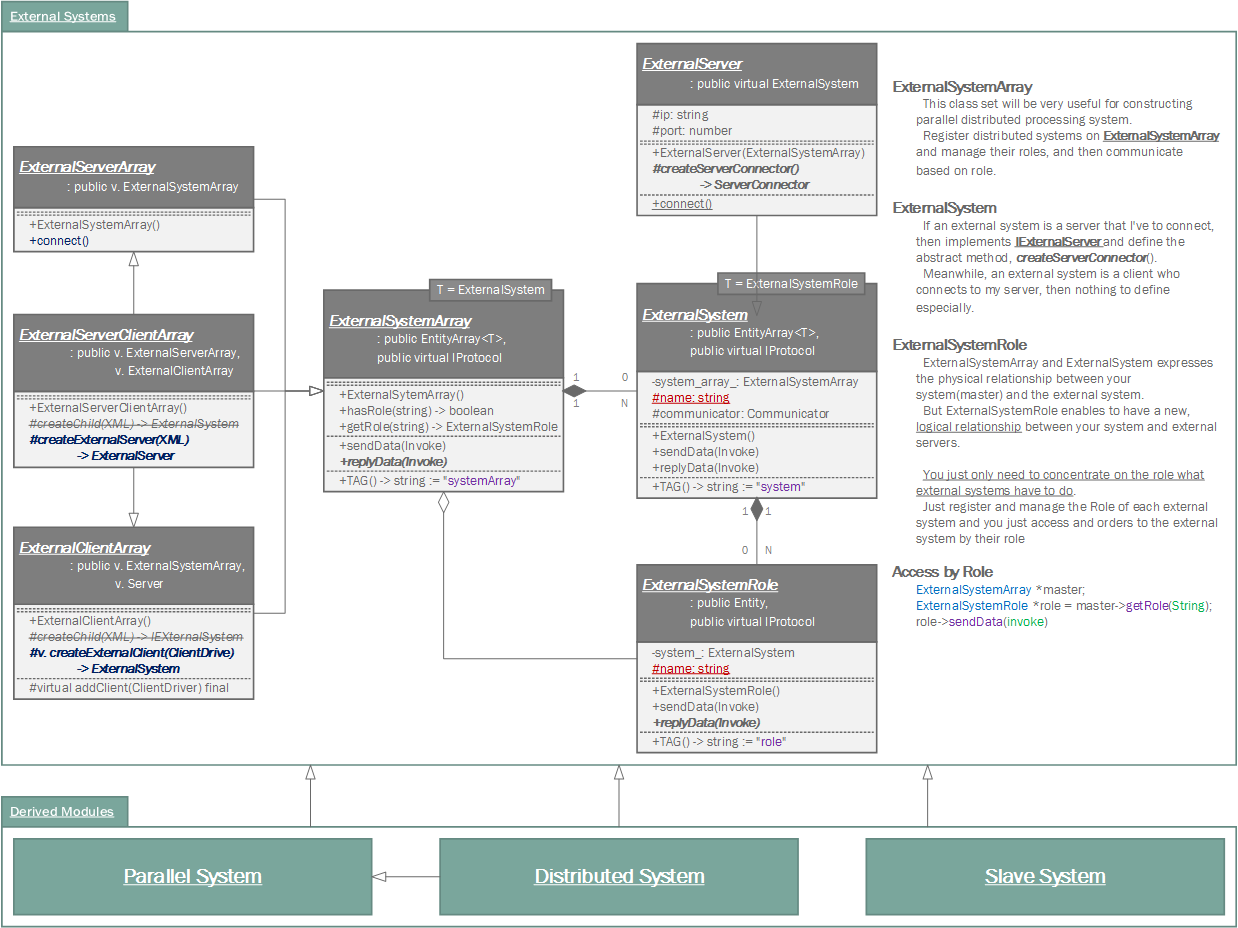|
Samchon Framework for CPP
1.0.0
|
|
Samchon Framework for CPP
1.0.0
|
#include <ExternalSystemArray.hpp>

Public Member Functions | |
| ExternalSystemArray () | |
| virtual | ~ExternalSystemArray ()=default |
| auto | hasRole (const std::string &key) const -> bool |
| auto | getRole (const std::string &key) const -> std::shared_ptr< ExternalSystemRole > |
| virtual void | sendData (std::shared_ptr< protocol::Invoke > invoke) |
| virtual void | replyData (std::shared_ptr< protocol::Invoke > invoke)=0 |
| virtual auto | CHILD_TAG () const -> std::string override |
| A tag name of children. More... | |
 Public Member Functions inherited from samchon::protocol::EntityGroup< Container, T, Key > Public Member Functions inherited from samchon::protocol::EntityGroup< Container, T, Key > | |
| virtual void | construct (std::shared_ptr< library::XML > xml) |
| Construct data of the Entity from an XML object. More... | |
| auto | find (const typename child_type::key_type &key) -> typename container_type::iterator |
| Get iterator to element. More... | |
| auto | find (const typename child_type::key_type &key) const -> typename container_type::const_iterator |
| Get const iterator to element. More... | |
| auto | has (const typename child_type::key_type &key) const -> bool |
| Indicates whether a container has an object having the specified identifier. More... | |
| auto | count (const typename child_type::key_type &key) const -> size_t |
| Count elements with a specific key. More... | |
| auto | get (const typename child_type::key_type &key) -> typename container_type::value_type & |
| Access the element by specified identifier(key). More... | |
| auto | get (const typename child_type::key_type &key) const -> const typename container_type::value_type & |
| Access the const element by specified identifier(key). More... | |
| virtual auto | toXML () const -> std::shared_ptr< library::XML > |
| Get an XML object represents the EntityGroup. More... | |
 Public Member Functions inherited from samchon::protocol::Entity< Key > Public Member Functions inherited from samchon::protocol::Entity< Key > | |
| virtual auto | key () const -> Key |
| Get a key that can identify the Entity uniquely. More... | |
 Public Member Functions inherited from samchon::protocol::IProtocol Public Member Functions inherited from samchon::protocol::IProtocol | |
| virtual void | replyData (std::shared_ptr< Invoke >)=0 |
| virtual void | sendData (std::shared_ptr< Invoke >)=0 |
Additional Inherited Members | |
 Protected Member Functions inherited from samchon::protocol::EntityGroup< Container, T, Key > Protected Member Functions inherited from samchon::protocol::EntityGroup< Container, T, Key > | |
| virtual auto | createChild (std::shared_ptr< library::XML >) -> child_type *=0 |
| Factory method of a child Entity. More... | |
An array and manager of external system drivers.
The ExternalSystemArray is an abstract class containing and managing external system drivers, ExternalSystem objects. Within framewokr of network, ExternalSystemArray represents your system and children ExternalSystem objects represent remote, external systems connected with your system. With this ExternalSystemArray, you can manage multiple external systems as a group.
You can specify this ExternalSystemArray class to be a server accepting external clients or a client connecting to external servers. Even both of them is also possible.

The ExternalSystemArray class can use Proxy Pattern. In framework within user, which external system is connected with this system, it's not important. Only interested in user's perspective is which can be done.
By using the logical proxy, user dont't need to know which role is belonged to which system. Just access to a role directly from ExternalSystemArray.getRole. Sends and receives Invoke message via the role.
Definition at line 68 of file ExternalSystemArray.hpp.
|
inline |
Default Constructor.
Definition at line 83 of file ExternalSystemArray.hpp.
|
virtualdefault |
Default Destructor.
Referenced by samchon::templates::external::ExternalSystemArray< Viewer >::ExternalSystemArray().

|
inline |
Test whether the role exists.
| name | Name, identifier of target role. |
Definition at line 104 of file ExternalSystemArray.hpp.
|
inline |
Get a role.
| name | Name, identifier of target role. |
Definition at line 121 of file ExternalSystemArray.hpp.
|
inlinevirtual |
Send an Invoke message.
| invoke | An Invoke message to send. |
Definition at line 145 of file ExternalSystemArray.hpp.
|
pure virtual |
Handle an {} message have received.
| invoke | An Invoke message have received. |
Referenced by samchon::templates::external::ExternalSystemArray< Viewer >::sendData().

|
inlineoverridevirtual |
A tag name of children.
< TAG>
<CHILD_TAG />
<CHILD_TAG />
</TAG>
Implements samchon::protocol::EntityGroupBase.
Definition at line 173 of file ExternalSystemArray.hpp.